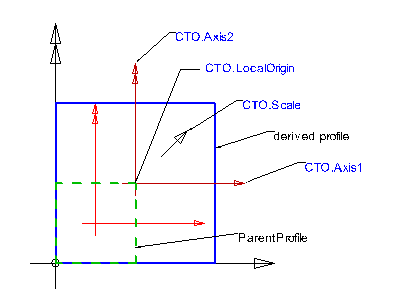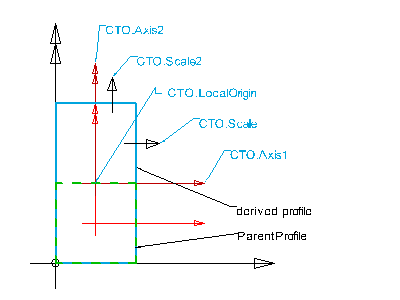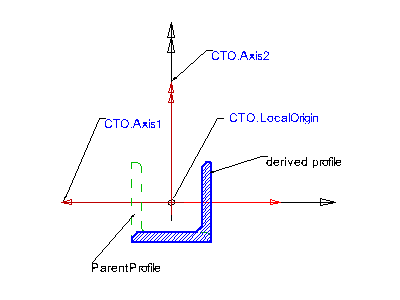
Parameter
The IfcDerivedProfileDef
is defined using the IfcCartesianTransformationOperator2D
(CTO), which is applied to the parent profile definition.
Example
The example shows an uniform scaling and a transformation
of an IfcRectangleProfileDef
to match the lower-left cardinal point. The attributes of the CTO are:
Axis1 = NIL (defaults to 1.,0.)Note: The ParentProfile has a Position = IfcCartesianPoint(<1/2 XDim>,<1/2 YDim>) already.
Axis2 = NIL (defaults to 0.,1.)
LocalOrigin = IfcCartesianPoint(<1/2 XDim>,<1/2 YDim>)
Scale = 2.

Parameter
The IfcDerivedProfileDef
is defined using
non uniform transformationsby applying the IfcCartesianTransformationOperator2DnonUniform
as a subtype of the 2D CTO.
Example
The example shows a non-uniform scaling and a translation of an IfcRectangleProfileDef
to match the lower-left cardinal point. The attributes of the CTO are:
Axis1 = NIL (defaults to 1.,0.)Note: The ParentProfile has a Position = IfcCartesianPoint(<1/2 XDim>,<1/2 YDim>) already.
Axis2 = NIL (defaults to 0.,1.)
LocalOrigin = IfcCartesianPoint(0.,<1/2 YDim)
Scale = 1.
Scale2 = 2.

Parameter
The IfcDerivedProfileDef
is defined using mirroring by applying the IfcCartesianTransformationOperator2D
(CTO) to the parent profile.
Example
The example shows a mirroring of an IfcLShapeProfileDef
to match the centre cardinal point. The attributes of the CTO are:
Axis1 = (0.,-1.)Note: The ParentProfile has a Position = IfcCartesianPoint(0.,0.).
Axis2 = NIL (defaults to 1.,0.)
LocalOrigin = IfcCartesianPoint(0.,0.)
Scale = NIL (defaults to 1.)
- black coordinate axes show the underlying coordinate system of the swept surface, swept area solid, or sectioned spine
- red coordinate axes show the position coordinate system of the parent profile
- brown coordinate axes
show the position coordinate system of the derived profi